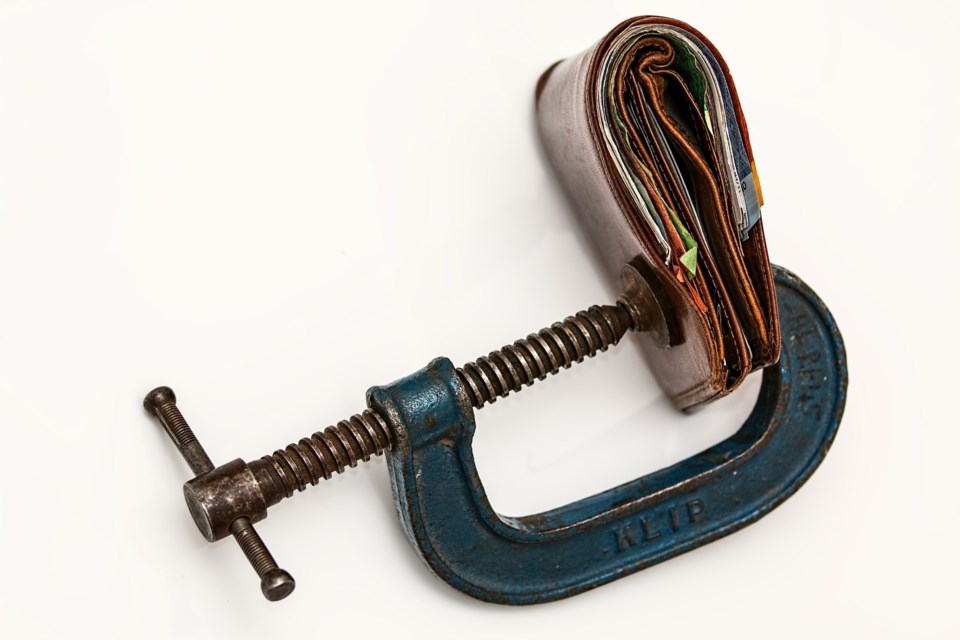With living costs increasing and many people trying to simply live, people are going into mountains of debt to pay bills, rent, groceries and provide for children or other family members. Debt can add up in a hurry, leaving many stressed over their finances.
According to numbers released by Statistics Canada for the second quarter of 2017 – which is the most recent data available – debt continues to climb.
Households borrowed $28.9 billion of credit market debt in the second quarter of 2017. In the first quarter, a total of $25.4 billion were borrowed. Lending in the form of consumer credit and non-mortgage loans doubled from $6.1 billion to $12.3 billion in the second quarter.
Debts can quickly spiral out of control if you are spending more than you are bringing in. After multiple payments missed, companies can send the debt to a credit collection agency.
Tatiana Chabeaux-Smith, a spokesperson for Consumer Protection B.C., wants consumers to know they are not government associated and are there to help.
“We used to be government many years ago,” she says. “We do enforce the province’s consumer protection laws, which is an administrative agreement or contract with the government that we will enforce these laws but we don’t get any money from them.”
The company licenses and regulates debt collectors in the province, mainly debt collection companies and individual debt collectors.
“The law in British Columbia, mostly when it comes to debt collection, mainly speaks to the communication practices,” Chabeaux-Smith says. “In this day and age, debt is something a lot of people have encountered.”
Collection agencies can be very forceful and intimidating when contacting you.
Here are some rights from Consumer Protection B.C. you may not know you have:
You have the right to ask a collection agency to contact you through writing only or through a lawyer in writing if you have acquired one. Collectors tend to call multiple times a day, but you can end those calls with a letter, or you can use the Consumer Protection B.C. online form.
You may also receive phone calls from a debt collector looking for another person. These calls can frequently happen if you have a new phone number and a person with debt changed theirs. Consumer Protection B.C. says you must notify them in writing and keep proof that you sent any letters. Some creditors – but not all – will take your number off of their list if you verbally tell them you are not that person.
Calls may come regarding a debt that you already paid or one that you feel you don’t owe. You do have a right to dispute any alleged debts. In essence, you are telling the debtor or agency that you do not agree you owe the debt and that you wish for the matter go to court for a resolution.
If a debt collector has not given you any details about any alleged debts you owe and you want to see them, you have the right to ask for more information in writing. Details can include the amount of the alleged debt owed and who owns the debt (use the online form from Consumer Protection B.C.)
Here are the actions a debt collector has to abide by:
*Collectors can only call between 1 and 5 p.m. on a Sunday
*Must not call you before 7 a.m. or after 9 p.m. on weekdays and Saturdays
*Must not call you, a friend or family member at any time on a statutory holiday
*They cannot discuss any details of debt with another person without your consent, but they can contact friends and family members to confirm contact information
*Cannot contact you in any way that will cost you money
*Must not publish or threaten to release details regarding the debt except to a credit reporting agency
*Cannot use any threatening, profane or intimidating language
*May not put excessive pressure on you
*Must not threaten to sue you unless they are taking legal action
They cannot collect any amount that is more than you owe. They can’t apply their interest rates or fees.
#Tip: you have the right to receive detailed information about the debts you owe. #debtcollection https://t.co/eHlnvsriJS ^ss
— ConsumerProtectionBC (@ConsumerProBC) August 16, 2018
Collectors are also not allowed to call your employer to discuss any details other than confirming the consumer’s employment status, title and business address in preparation for legal actions to take place.
Chabeaux-Smith also wants to remind consumers ignoring phone calls or correspondence from debt collections only makes the situation worse. She recommends speaking with the collectors to see what arrangements can be made to satisfy both parties.
If you feel any debts are too much to handle or not financially possible, you can contact a credit counselling association or another financial advisor.


.png;w=120;h=80;mode=crop)
